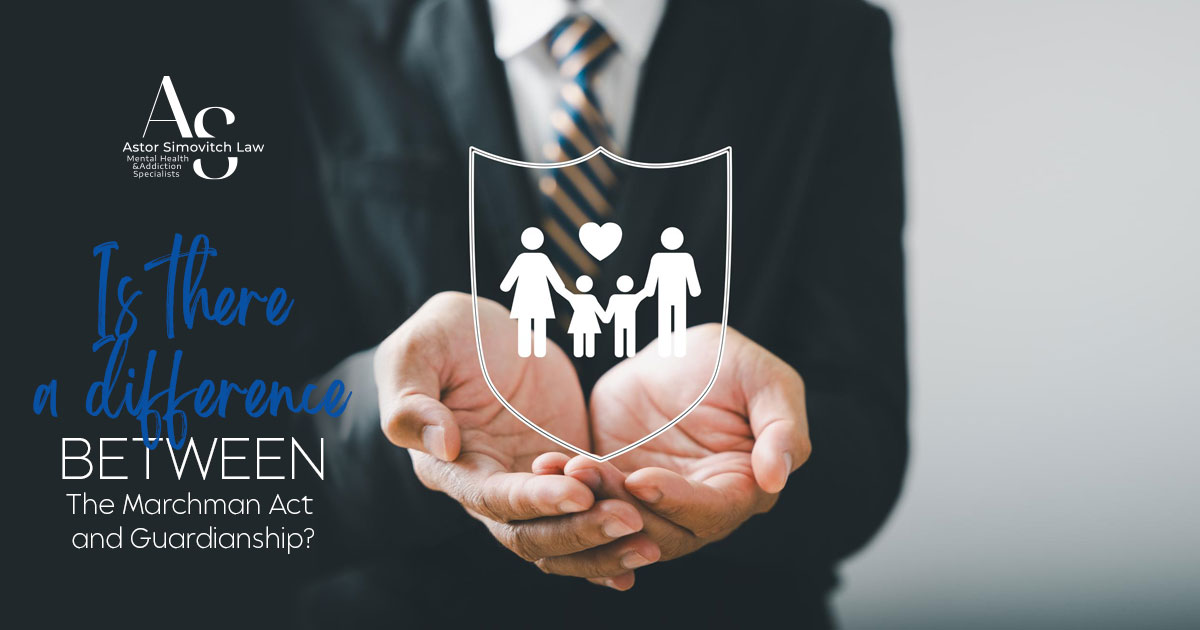Is There A Difference Between The Marchman Act And Guardianship?

Families seeking treatment for loved ones battling addiction face the overwhelming task of navigating Florida’s complicated substance use and mental health laws. In this article, we provide a basic overview of two important legal mechanisms for assisting loved ones with substance abuse disorders:
- The Marchman Act
- Appointment of a Guardian through the emergency and permanent guardianship process
By understanding their different purposes and processes, you’ll be in a better position to decide on a course of action appropriate for your loved one. If you are still uncertain about which approach to take, speaking with an experienced Marchman Act and guardianship attorney can help you determine what your next steps should be.

What Is The Marchman Act?
The Marchman Act, officially referred to as the Hal S. Marchman Alcohol and Other Drug Services Act, was passed in 1993 with the overarching purpose of helping those with substance use disorders access treatment. The Act is designed to compel a person struggling with a substance use disorder to be evaluated and assessed for treatment after attempts to persuade them to access treatment voluntarily have failed.
The Act allows a spouse, family member, friend, sheriff, or treatment center representative to initially petition the court for an order of assessment directing the person concerned to be taken and assessed for a substance use disorder. This process is referred to as ‘involuntary assessment’. Families usually choose to hire a Marchman Act attorney to prepare and file the petition and represent them in court.
If the petition is granted, the person can be held in a receiving facility for up to 72 hours while they are being assessed. During the assessment period, the person can also be given emergency medical treatment if required. If the assessment determines that the person requires treatment for a substance use disorder, a hearing will be conducted before the Court requesting an order mandating admission to a treatment facility for a period of up to 90 days.

What Is Guardianship?
Guardianship orders serve a very different purpose than the Marchman Act. They were typically used to give family members the power to manage the affairs of their elderly loved ones who no longer can make medical, financial, and other decisions for themselves. However, guardianship orders are also frequently used in cases where individuals with severe mental illness and/or substance use disorders who no longer have the capacity to manage their own affairs.
Loved ones, an attorney, and a professional guardian can be appointed as a guardian should they meet the requirements. The person in respect of whom a guardianship order has been obtained is referred to as a ‘ward’. The specific powers that a guardian has with respect to their ward varies from case to case, as the court will determine which powers to delegate depending on the circumstances of the ward. In most cases, once someone has been appointed as a guardian, they will have the authority to make medical, financial, legal, and administrative decisions on their ward’s behalf, to access their medical records, and to determine where they reside.
Key Differences Between The Marchman Act And Guardianship
The Marchman Act serves the narrow purpose of having a loved one involuntarily admitted for assessment and treatment for a substance use disorder. Beyond this, the Marchman Act gives family members very little control over their loved one’s movements and affairs, compared to when a guardianship is in place. In contrast, the law relating to guardianship serves the much broader purpose of giving a family member control over their loved one’s medical treatment, residence, finances, and general affairs.
While Marchman Act petitions can only be used to help a person who is impaired primarily due to a substance use disorder, guardianship can be used in a wider range of cases. For example, guardianship can be used for elderly people suffering with Dementia or Alzheimer’s, for people with severe mental illnesses such as schizophrenia or multiple personality disorder, or for developmentally disabled minors or adults.
As two distinct legal mechanisms, Marchman Act and guardianship also have different sets of criteria, and one may be applicable in circumstances where the other isn’t. This is why it is important to consult with an attorney with Marchman Act and guardianship law experience to help you determine which process is most appropriate for your loved one’s case. Sometimes, both a Marchman Act and Guardianship can be filed in the same case.
What Are The Criteria For Admission Under The Marchman Act?
For a Marchman Act to be granted, there must be reason to believe that they are experiencing impairment due to substance abuse, and because of this impairment, they have:
- Lost the power of self-control;
- Are unable to recognize that they require treatment and cannot make rational decisions concerning their own well-being; and
- Their substance abuse is affecting them to such an extent that they pose a real and present threat of harm to themselves and/or others.
If these three criteria have been established, the court will order that the person be taken to a treatment facility for involuntary assessment by law enforcement. Once the person has been assessed, the court can order treatment for up to ninety (90) days.

What Are the Criteria For Obtaining Guardianship?
The criteria for obtaining guardianship under Florida Law are more stringent, as guardianship is a powerful legal tool that has a significant impact on a person’s legal rights and freedoms. Essentially, permanent guardianship can only be obtained if a person is found to be incapacitated. However, in cases of substance use and mental illness, an Emergency Temporary Guardianship (ETG) can be granted for ninety (90) days, without the appointment of an expert, when “The court must specifically find that there appears to be imminent danger that the physical or mental health or safety of the person will be seriously impaired or that the person’s property is in danger of being wasted, misappropriated, or lost unless immediate action is taken”.
The process for permanent guardianship begins when a concerned loved one or other interested person files a Petition for Incapacity and a Petition for Permanent Guardianship. The court must then appoint an examining committee that will conduct an evaluation of the allegedly incapacitated person and file a report with the court. The examining committee is a three-person panel consisting of at least one physician or psychiatrist, and two other members (physicians, psychologists, psychiatrists, gerontologists, nurses, and licensed social workers can all serve on examining committees).
The court will consider the committee’s findings and consider whether there is a less restrictive alternative to guardianship. If the court decides that it is appropriate to grant permanent guardianship, it will also decide which powers to grant the guardian based on the circumstances of the case and the examining committee’s report. Florida law requires that all guardians be represented by counsel.
How Can The Marchman Act And Guardianship Be Used Together?
Although the Marchman Act and guardianship are two very different legal tools, they can be used in combination to ensure that a person struggling with a substance use disorder and co-occurring mental health disorder benefits from a targeted legal intervention that addresses their specific needs. Although the Marchman Act is an effective tool for getting a loved one into treatment, in some cases this is not sufficient. In these cases, a guardianship can be filed to give the family control over medical decisions, residence, and general affairs of their loved one while they are on the road to recovery. This can also help limit their access to the funds that allow them to feed their addiction, or help ensure that they are following their treatment plan.
Explore Your Options With An Experienced Marchman Act Attorney
If you have a loved one who is struggling with substance use, your top priority is to get them the help they need as soon as possible so that healing and recovery can begin. At Astor Simovitch Law, we have helped thousands of families get their loved one the treatment and care they need to start overcoming their addiction.
Our skilled, compassionate Marchman Act and guardianship attorneys have many years of experience in this complex area of law and will be able to advise you on the best course of action given your loved one’s particular needs.
Contact us today at 561-419-6095 to find out more about our areas of expertise or arrange a confidential consultation.